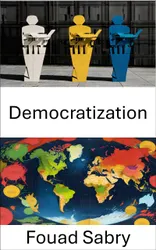Discover the power of "Sortition" in Political Science. This book explores the ancient origins and modern applications of random selection in governance. It is essential for professionals, students, and enthusiasts interested in fairness and inclusivity within decision-making processes.
Chapters Brief Overviews:
1-Sortition:Explore its origins and evolution as a method for fair decision-making.
2-Boule (Ancient Greece):Learn how random selection was used in ancient Greece's political system.
3-Kleroterion:Understand this ancient device's role in sortition and democratic systems.
4-Civic Lottery:Examine how lotteries can offer a new form of political representation.
5-Citizens' Reference Panel:See how sortition fosters informed discussion and diversity.
6-Citizens' Assembly:Learn about their role in generating policy consensus.
7-Hélène Landemore:Insights from scholars on the potential of sortition.
8-Deliberative Opinion Poll:Discover how random sampling informs public discourse.
9-Deliberative Referendum:Explore informed decision-making through deliberative referendums.
10-Global Assembly:Reflect on how sortition could address global political issues.
11-Democracy:Sortition's role in enhancing democratic legitimacy.
12-Election:Compare the pros and cons of elections vs. sortition.
13-Direct Democracy:Assess sortition’s potential for mass participation and informed choices.
14-Deliberative Democracy:The joint capacity of sortition and deliberative democracy.
15-Participatory Democracy:How sortition ensures broad participation.
16-History of Democracy:Sortition's influence on historical governance practices.
17-Applications of Randomness:The use of randomness for fairness and inclusivity.
18-Criticism of Democracy:How sortition addresses biases in democratic systems.
19-Types of Democracy:How sortition integrates into democratic frameworks.
20-Outline of Democracy:A guide to democratic principles enhanced by sortition.
21-Athenian Democracy:Sortition's role in ancient and modern political thought.
"Sortition" offers profound insights into governance and democracy, emphasizing random selection as a way to enrich civic engagement. Perfect for readers looking to deepen their understanding of democratic systems and challenge conventional thinking, this book provides fresh perspectives on how societies can achieve fairer, more inclusive decision-making.
























